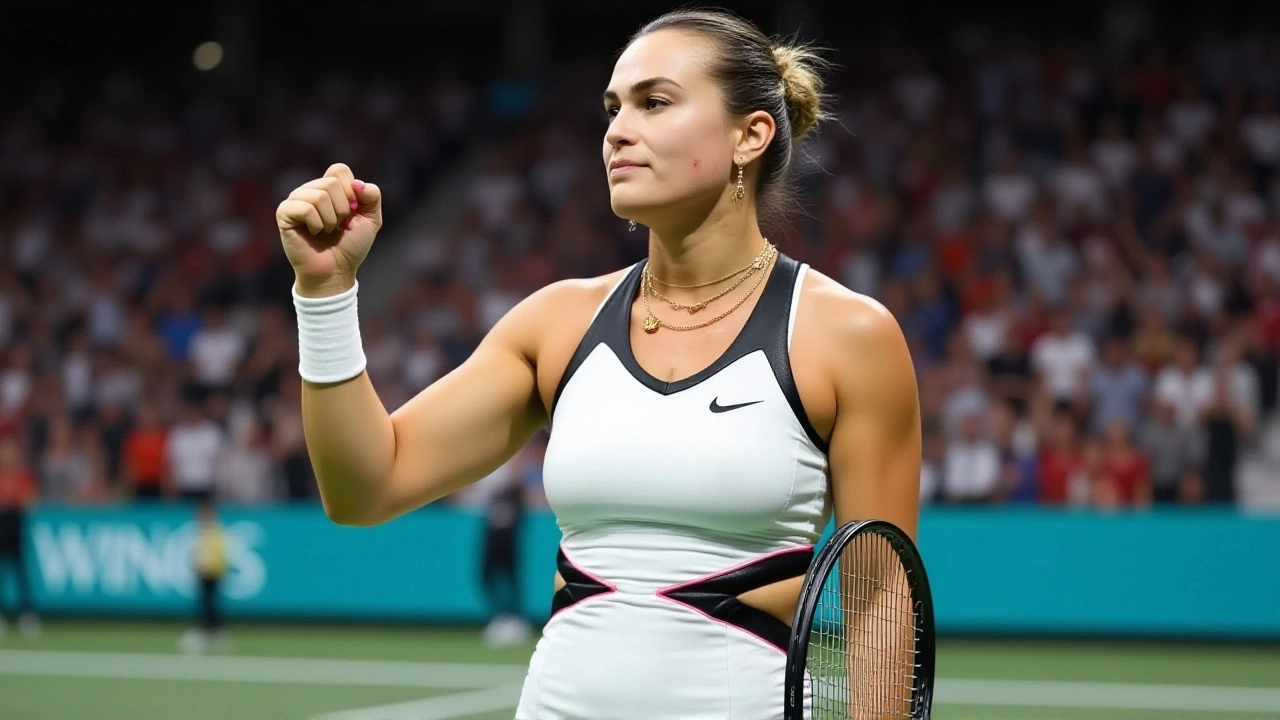 11
Oct,2025
11
Oct,2025
When Aryna Sabalenka, World No. 1 from Belarus stepped onto Court 1 at the Wuhan OpenOptics Valley International Tennis Center in Wuhan, Hubei Province, China, she was chasing a perfect 19‑match run that would stretch back to her 2018 title. The quarterfinal on Thursday, October 9, 2025, ended in a 6‑3, 6‑2 win over Liudmila Samsonova, the Russian No. 16 seed, and extended her unbeaten streak to 19 matches at a single WTA 1000 event. The next day she dispatched Kazakhstan’s Elena Rybakina to push the tally to 20, a number not seen since Serena Williams dominated a similar Asian stop. But the fairy‑tale turned on Saturday, October 11, when sixth‑seeded American Jessica Pegula knocked Sabalenka out 2‑6, 6‑4, 7‑6(2) in a two‑hour‑19‑minute semi‑final that set up an all‑American final against Coco Gauff.
Sabalenka’s Dominance in Wuhan
Since the tournament’s debut in 2014, Wuhan has become a proving ground for the sport’s toughest competitors. Sabalenka first lifted the trophy in 2018, defended it in 2019, and reclaimed it in 2024 after a pandemic‑induced hiatus. Her 20‑match run means she has now won every match she entered at the event, a feat matched by only seven players in the Open Era, according to UBITennis.net. The Dongfeng Voyah‑sponsored tournament, held at a 13,000‑seat arena, has a reputation for fast hard courts that reward aggressive baseline play – exactly Sabalenka’s strength.
"I felt the rhythm from day one," Sabalenka told reporters after the Rybakina match. "The ball bounces low, the crowd is electric, and I just want to keep feeding that momentum." Her aggressive forehand and powerful serve have been on full display, averaging 112 mph on first serves throughout the week.
- Three Wuhan titles (2018, 2019, 2024)
- 20 consecutive wins at a single WTA 1000 event
- Average first‑serve speed: 112 mph
- Career‑high ranking: World No. 1 (as of July 2025)
The Day the Streak Ended
Friday night, the stadium lights dimmed and the roof was closed – a change that Pegula later said threw off her timing. The American opened the match with a blistering 6‑2 first set, using deep slices to keep Sabalenka’s pace in check. The Belarusian rallied in the second, breaking early and taking it 6‑4, but Pegula’s resilience shone through. At 5‑5 in the decider, the two seasoned pros exchanged a dozen deuces before Pegula finally slid a backhand winner to seal the set 7‑6(2).
"I can’t remember the last time I played two sets," Pegula said to ESPN, breathlessly. "It felt like a marathon, but the crowd kept feeding me energy. I just focused on one point at a time." The win was Pegula’s ninth semi‑final appearance at a WTA 1000 event and propelled her into the championship match for the first time since her 2021 Miami Open title.
Pegula’s Path to the Final
Pegula’s run has been anything but smooth. In the second round on October 8, she survived seven match points against fellow American Hailey Baptiste, eventually winning 6‑3, 7‑6(4). A day later she edged Russia’s Ekaterina Alexandrova 7‑5, 3‑6, 6‑3, surviving a break‑point at 2‑2 in the final set. Those gritty victories gave her a confidence boost that translated into the semi‑final triumph over Sabalenka.
Statistically, Pegula hit 24 winners and 17 unforced errors in the semi‑final – a margin of just +7, suggesting a razor‑thin line between victory and defeat. Her serve percentage climbed to 78 % in the third set, a personal best in a three‑set match.

What the Streak Means for Women’s Tennis
Long winning streaks at a single venue are rare in the modern era because of a deeper talent pool and more varied surface schedules. The only comparable runs are Serena Williams’ nine‑straight titles at the Beijing Open (2010‑2015) and Martina Navratilova’s eight at the 1980s Virginia Slims circuit. Sabalenka’s 20‑match stretch puts her in the same conversation, highlighting her ability to dominate under consistent conditions.
Experts say the streak underscores a shift toward power‑driven baseline tennis. Former WTA president Jeff Ryan noted, "Sabalenka’s consistency on a fast hard court shows how the sport rewards aggressive play, but Pegula’s comeback demonstrates that tactical variety still wins the day." The clash also sparked debate about mental toughness – a factor many coaches now emphasize as much as physical preparation.
Looking Ahead: Upcoming Events
The final on Sunday, October 12, will pit Pegula against 22‑year‑old prodigy Coco Gauff, who has been on a hot streak since a surprise win at the China Open in Beijing last week. Both players will be looking to cap a week of breakthrough performances with a WTA 1000 title, which also carries 1,000 ranking points – a potential game‑changer for the year‑end race.
Meanwhile, Sabalenka will regroup for the upcoming Asian swing, starting with the Tokyo Pan Pacific Open on October 19. If she can bounce back quickly, she could still finish the season inside the top two, a position that would guarantee a favorable draw at the 2026 Australian Open.
Frequently Asked Questions
How does Sabalenka’s Wuhan streak compare to other historic runs?
Sabalenka’s 20‑match streak is the longest at a single WTA 1000 event since Serena Williams won nine straight titles in Beijing (2010‑2015). Only seven other players have ever won 19 or more consecutive matches at one venue, placing Sabalenka among legends like Steffi Graf and Martina Navratilova.
What caused the shift in momentum during the Sabalenka‑Pegula semi‑final?
Pegula’s early break in the first set let her dictate play, and the closed‑roof conditions slowed the ball slightly, neutralizing Sabalenka’s power. Pegula’s relentless return game forced several double faults from Sabalenka, and a decisive break at 5‑5 in the third set clinched the match.
Who are the other players in the all‑American final?
The final will feature Jessica Pegula and Coco Gauff. Both have shown strong form this week, with Pegula surviving a grueling semi‑final and Gauff coming off a dominant win against Zhang Shuai in the quarter‑finals.
What does the result mean for the WTA rankings?
Pegula earns 1,000 points for reaching the final, moving her into the top five for the first time. Sabalenka retains her World No. 1 spot but drops a few places in the points race, while Gauff’s semi‑final appearance also adds a solid 650 points.
When is the next major tournament after Wuhan?
The WTA calendar heads to the Pan Pacific Open in Tokyo on October 19, followed by the prestigious China Open in Beijing starting October 26. Both events are also WTA 1000 level and will influence the year‑end rankings.




